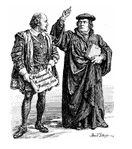
A Trialogue With C.S. Lewis, Martin Luther & Thomas Aquinas
IS THERE SUCH A THING AS 'MERE CHRISTIANITY'?
The scene: C.S. Lewis is sitting alone late at night at his big oak desk at The Kilns, Oxford, writing Mere Christianity, his little masterpiece that is destined to enlighten millions of minds and help convert countless souls. He has written everything except the Introduction. (Good authors usually delay their Introductions for the same reason good matchmakers do: They first have to get to know what they are to introduce.)
Lewis suddenly sits up with a start. He seems to see two visitors in his room. He rubs his eyes, but the two visitors do not disappear. One is a very large, very fat Dominican friar, white-robed and tonsured, apparently in a fit of absent-minded abstraction. The other is a black-robed Augustinian monk, only a little less formidably fat, who is fanning his fanny with his robe. He has apparently just passed wind. He mutters: “When I fart in Wittenberg, the Pope smells it in Rome.”
Lewis’s first thought is that there are four possibilities: These two creatures must come from Heaven or Hell or Purgatory or Central Casting. Then he thinks a fifth possibility more likely: They come from his own imagination. He will never settle this question in his mind with certainty, though he will enjoy conversation with them that is so lively that it makes the fifth possibility unlikely.
They speak English, but with accents. Lewis can’t help associating the Dominican’s accent with the Mafia and the Augustinian’s with the Gestapo. By an effort of will and charity he exorcises these thoughts, and he is rewarded by divine providence in that the two figures do not disappear, but speak.
Luther: What are you writing there, Brother Jack?
Lewis: Are you…Brother Martin?
Luther: That habit you have of answering a question with another question — are you a rabbi or a psychiatrist?
You May Also Enjoy
C.S. Lewis's definition is losing its very intelligibility
Williams, an influential British theologian and accomplished man of letters, was best known as a principal member of the Inklings.
What characterizes Thomist thought? It is philosophy intrinsically consonant with common sense. For St. Thomas the real is just that, real.

